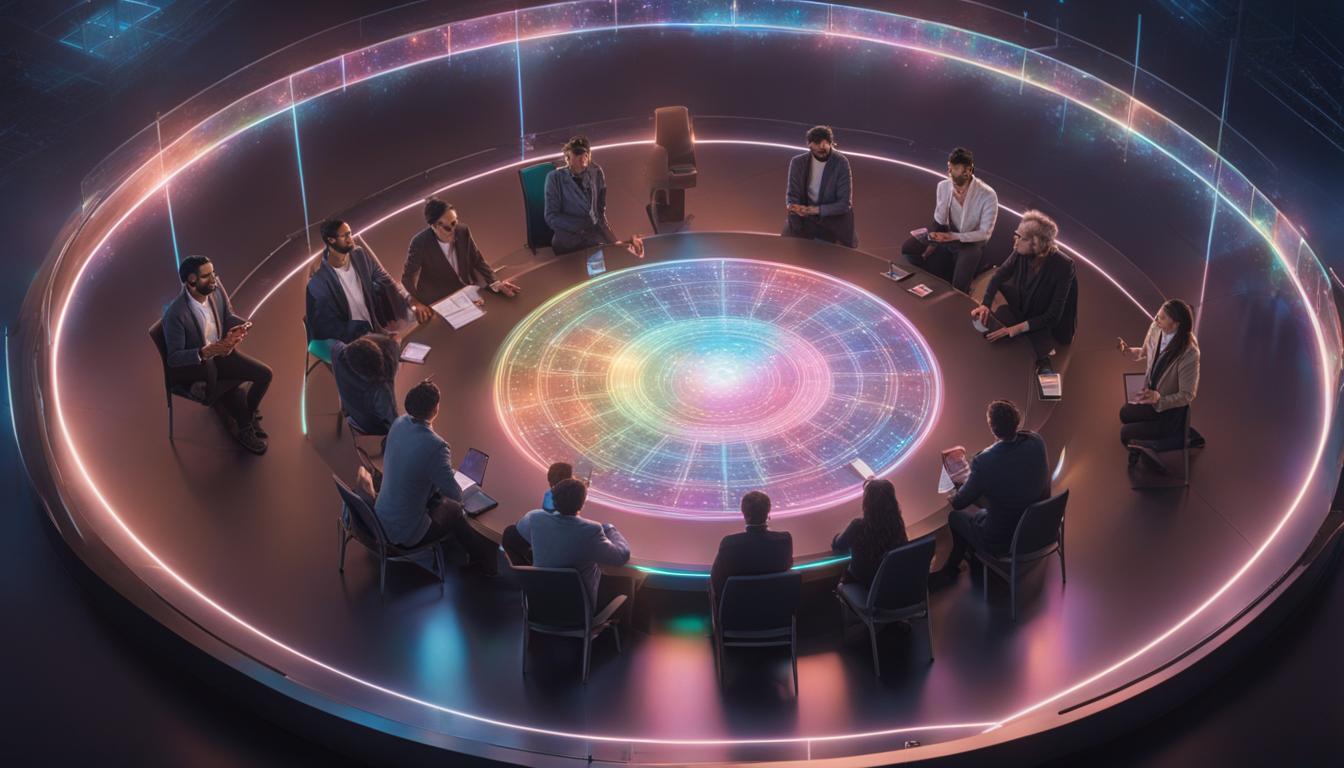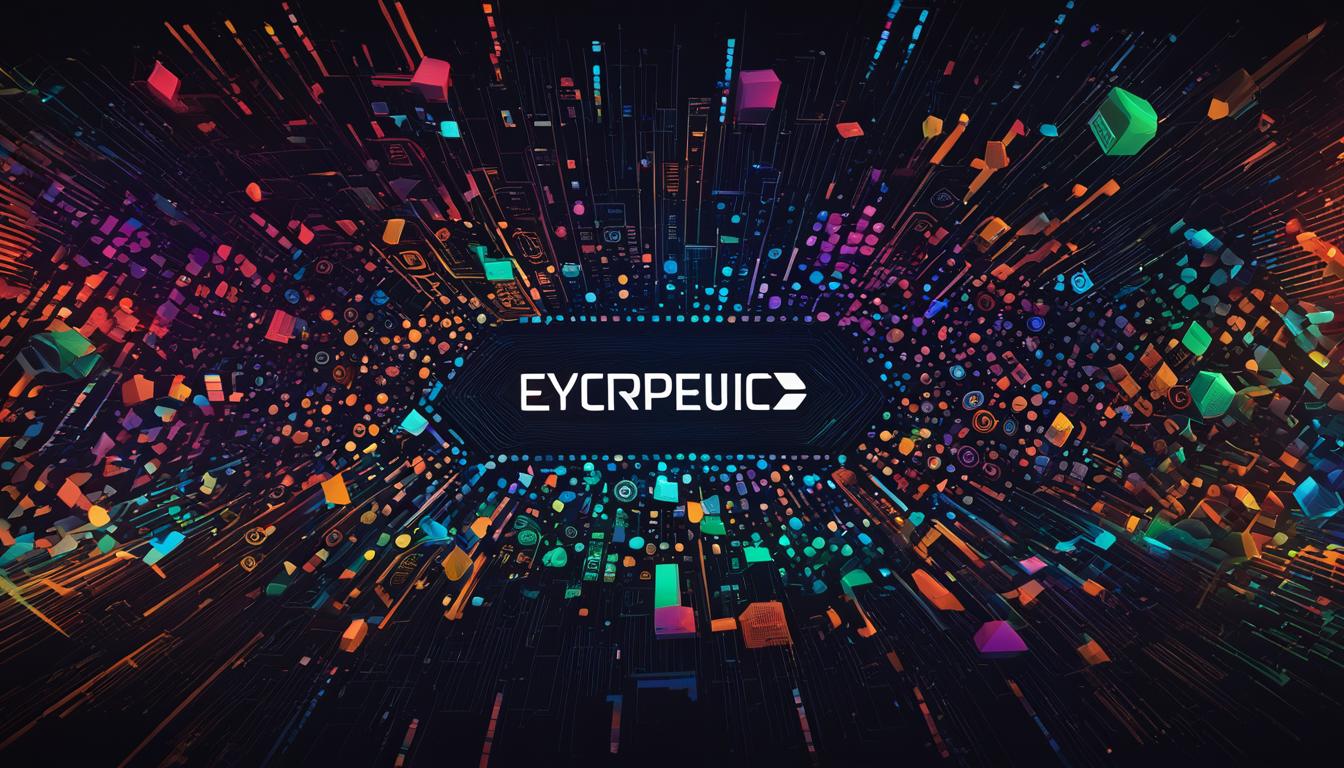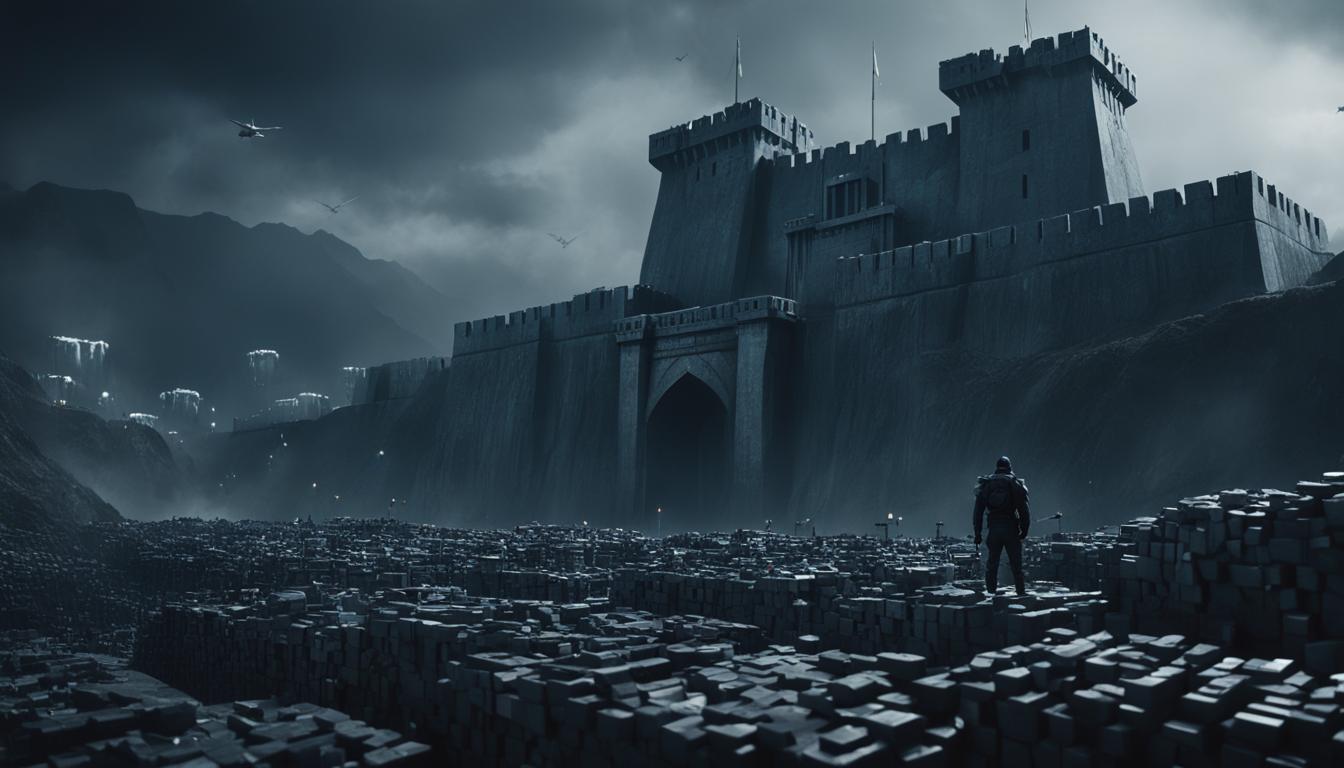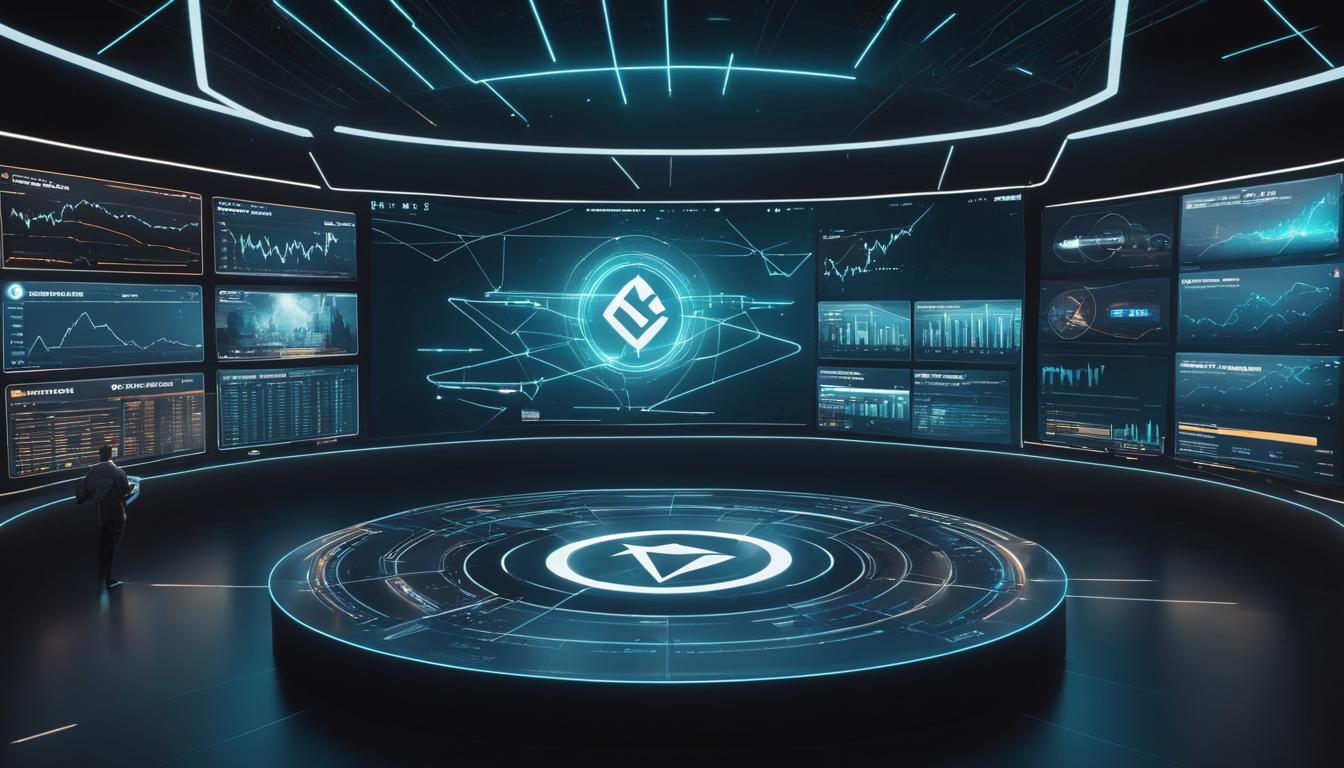Decentralized governance is revolutionizing the way organizations operate, and one of the most promising developments in this space is the rise of Decentralized Autonomous Organizations (DAOs). These innovative entities leverage blockchain technology and consensus mechanisms to create a new paradigm of decision-making and organizational management.
DAOs are unique in that they operate without a central governing body, relying instead on the collective intelligence and participation of tokenholders. This bottom-up approach to governance ensures greater transparency, inclusivity, and accountability.
Key Takeaways:
- Governance in blockchain networks is being transformed by the emergence of DAOs.
- DAOs operate without a central governing body, empowering tokenholders to participate in decision-making.
- Consensus mechanisms and blockchain technology ensure transparency and accountability in DAOs.
- The DAO, one of the first DAOs, was created to streamline cryptocurrency transactions and automate decision-making.
- Security is paramount in DAOs to protect against exploitation and loss of funds.
The Purpose of Decentralized Autonomous Organizations (DAOs)
Decentralized Autonomous Organizations (DAOs) have emerged as a governance model that aims to promote decentralized oversight and management of entities. With a focus on community governance and decision-making protocols, DAOs provide a platform for network participants to actively participate in the operations of an organization.
DAOs are inspired by the decentralized nature of digital currencies and seek to achieve higher levels of privacy and security through collective governance. They operate based on smart contracts and consensus mechanisms, which dictate decision-making based on blockchain activity.
Voting power in DAOs is often distributed based on the number of tokens held by participants. This ensures that individuals who hold a larger stake in the organization have a greater say in decision-making. Additionally, DAOs often have treasuries with funds that can be used based on the voting decisions of tokenholders.
The Benefits of DAOs
DAOs offer several advantages compared to traditional organizations. By embracing decentralization, DAOs enable decision-making by a larger group of individuals, providing a wider range of perspectives and reducing the concentration of power. This increased participation empowers individuals and gives them a direct say in matters that affect the organization.
Transparency and publicity are inherent in DAOs, as all activity and voting decisions are recorded on the blockchain. This fosters trust among tokenholders and encourages actions that benefit the reputation of the community. Furthermore, DAOs create opportunities for the formation of global communities where like-minded individuals can collaborate seamlessly.
Overall, DAOs promote inclusivity and community-driven initiatives, allowing for a more democratic and decentralized approach to governance. As blockchain technology continues to advance, DAOs are expected to play a crucial role in shaping the future of decentralized networks.
How DAOs Work
Decentralized Autonomous Organizations (DAOs) rely on smart contracts and voting mechanisms to function effectively. These technological innovations enable DAOs to achieve decentralized governance and decision-making. Here are some key details on how DAOs work:
Smart Contracts
In DAOs, smart contracts serve as the foundation for decision-making. These coded agreements are self-executing and automatically execute predefined rules and actions based on blockchain activity. Smart contracts ensure that the governance process is transparent, immutable, and free from human intervention. They play a critical role in enabling DAOs to operate autonomously.
Voting Mechanisms
Voting in DAOs is conducted through the blockchain, allowing token holders to participate in the decision-making process. Token holders can cast votes on various proposals, such as changes to the governance structure, allocation of funds, or the introduction of new features. The voting mechanisms in DAOs are designed to be transparent and fair, with the weight of voting power typically determined by the number of tokens held by participants.
Token Holders
Token holders play a crucial role in the governance of DAOs. They have the power to shape the direction and policies of the organization by participating in voting processes. The number of tokens held by a participant often determines their voting power, incentivizing active participation and aligning the interests of token holders with the success of the DAO. Token holders must stay engaged and informed to make informed decisions that benefit the DAO and its community.
Decision-Making Process
DAOs establish a transparent and publicly viewable decision-making process. Proposals are typically submitted by members of the DAO community and are subject to scrutiny and discussion. Once a proposal is submitted, token holders have the opportunity to cast their votes. The proposal that receives the most votes, based on the predefined voting rules, is then executed. This process ensures that all stakeholders have a voice in the decision-making process and helps maintain the integrity and fairness of the DAO.
| Key Components | Description |
|---|---|
| Smart Contracts | Coded agreements that automate decision-making based on blockchain activity. |
| Voting Mechanisms | Processes that allow token holders to cast votes on proposals and decisions. |
| Token Holders | Individuals who hold tokens and have voting power in the DAO. |
| Decision-Making Process | Transparent and publicly viewable process for submitting and voting on proposals. |

The Benefits of DAOs
Decentralized Autonomous Organizations (DAOs) offer numerous advantages over traditional organizations. Let’s explore some of the key benefits that make DAOs an appealing model for decentralization, participation, publicity, and community.
Enhanced Decentralization
One of the primary benefits of DAOs is the level of decentralization they provide. By distributing decision-making power among token holders, DAOs ensure that no single entity or authority controls the organization. This decentralized approach allows for a wider range of perspectives and reduces the risk of corruption or undue influence. As a result, DAOs can foster a more inclusive and democratic governance model.
Empowered Participation
Participation is at the core of DAOs, giving individuals a direct voice and voting power in organizational matters. Token holders have the opportunity to actively engage in decision-making processes, which not only empowers them but also ensures that their interests are represented. This level of participation helps to build a stronger sense of ownership and community within DAOs.
Transparency and Publicity
Transparency is a fundamental aspect of DAOs, as all votes and activities are recorded on the blockchain and publicly viewable. This high level of transparency promotes trust and accountability among token holders. Additionally, DAOs often incentivize actions that benefit the reputation of their community, further promoting good governance and responsible decision-making.
Fostering Global Communities
DAOs have the unique ability to bring together like-minded individuals from around the world. By leveraging blockchain technology, DAOs enable seamless collaboration and interaction among community members, regardless of geographical boundaries. This global network of individuals fosters innovation, knowledge sharing, and collective problem-solving, leading to the development of truly global and impactful initiatives.
Table: Comparing the Benefits of DAOs
| Benefit | Description |
|---|---|
| Enhanced Decentralization | Power distributed among token holders, reducing central authority. |
| Empowered Participation | Direct voice and voting power for token holders in decision-making. |
| Transparency and Publicity | All votes and activities recorded on the blockchain for public scrutiny. |
| Fostering Global Communities | Bringing together individuals from different locations for collaboration. |
In conclusion, DAOs offer a range of benefits that make them an attractive model for decentralized governance. Their enhanced decentralization, empowered participation, transparency and publicity, and ability to foster global communities set them apart from traditional organizations. As blockchain technology continues to evolve, DAOs are poised to play a crucial role in shaping the future of governance and community-driven initiatives.
Limitations of DAOs
While DAOs offer numerous benefits and are heralded as the future of decentralized governance, they also come with their fair share of limitations that need to be considered. Understanding these limitations is crucial for anyone looking to participate in or establish a DAO.
Speed
The decision-making process in DAOs can be relatively slow compared to traditional centralized organizations. This is primarily due to the need to gather and consider input from a larger group of participants. While this inclusivity is a strength of DAOs, it can lead to longer deliberation times, especially when there are diverse opinions and perspectives to consider. However, advancements in technology and the optimization of voting mechanisms are expected to address this limitation over time.
Education
Education and communication are ongoing challenges in DAOs. Participants may have varying levels of understanding and access to resources, which can hinder effective decision-making and collaboration. It is essential for DAOs to prioritize educational initiatives, providing resources and fostering knowledge-sharing environments to empower participants with the necessary information to actively contribute and understand the implications of their votes.
Inefficiency
DAOs can suffer from inefficiency if they spend excessive time discussing proposed changes instead of implementing them. Without proper structure and guidelines, DAOs may become caught up in endless debates and deliberations, leading to delays in decision-making. It is crucial for DAOs to establish clear processes and frameworks to ensure efficient and effective decision-making, balancing the need for thorough discussions with the need for timely actions.
Security
Security is a paramount concern in DAOs. As DAOs handle significant assets and rely on technology, they are susceptible to exploits and vulnerabilities. Technical expertise is required to secure the infrastructure and protect funds from hackers and malicious actors. DAOs must prioritize security measures, including audits, multi-signature wallets, and ongoing monitoring to mitigate the risk of breaches and safeguard participant assets.
Conclusion
Decentralized Autonomous Organizations (DAOs) are revolutionizing governance in blockchain networks and paving the way for the future of decentralization. By utilizing blockchain technology and tokenholder participation, DAOs offer a bottom-up management approach that empowers individuals and promotes transparency.
DAOs prioritize decentralized decision-making, allowing tokenholders to actively participate in the management and decision-making processes. With power distributed among the tokenholders, DAOs eliminate the need for a central authority and ensure that all votes and activities are recorded on the blockchain for transparency.
While DAOs do have limitations, such as potential inefficiencies and security concerns, they present a powerful model for the future of governance. As blockchain technology continues to advance, DAOs are expected to play a crucial role in shaping the decentralized landscape and fostering global communities.
In summary, DAOs represent a significant development in the world of blockchain governance. They offer decentralized oversight, community participation, and transparency. As we look ahead, DAOs are poised to lead the way in creating a more inclusive, participatory, and decentralized future.
FAQ
What is a decentralized autonomous organization (DAO)?
A decentralized autonomous organization (DAO) is a legal structure that operates without a central governing body. It uses blockchain technology and tokenholders to make decisions in a bottom-up management approach.
How do DAOs make decisions?
In a DAO, there is no central authority. Power is distributed among tokenholders who cast votes on various decisions. All votes and activity in a DAO are recorded on a blockchain for transparency.
What was the first DAO created?
The DAO, one of the first DAOs, was created to automate decisions and facilitate cryptocurrency transactions.
How do DAOs ensure security?
DAOs must prioritize security to prevent exploitation and loss of funds. Technical expertise is required to protect the funds and prevent any potential exploits.
What is the purpose of DAOs?
The purpose of DAOs is to promote decentralized oversight and management of an entity, allowing tokenholders to participate in the decision-making process.
How are votes conducted in DAOs?
Voting in DAOs is conducted through the blockchain, with tokenholders casting votes on mutually-exclusive options. The weight of voting power is often determined by the number of tokens held by participants.
What are the advantages of DAOs?
Some advantages of DAOs include decentralization, empowering individuals, transparency, fostering global communities, and promoting inclusivity and community-driven initiatives.
What are the limitations of DAOs?
Some limitations of DAOs include the potentially longer decision-making process, challenges in education and communication, inefficiency if too much time is spent discussing changes, and the need for strong security measures.
Source Links
- https://en.wikipedia.org/wiki/Decentralized_autonomous_organization
- https://www.investopedia.com/tech/what-dao/
- https://cointelegraph.com/learn/what-is-a-dao
- Popular Cryptocurrency Exchanges - September 18, 2024
- Cryptocurrency Exchange Security - September 17, 2024
- Cryptocurrency Exchange User Experience - September 16, 2024






